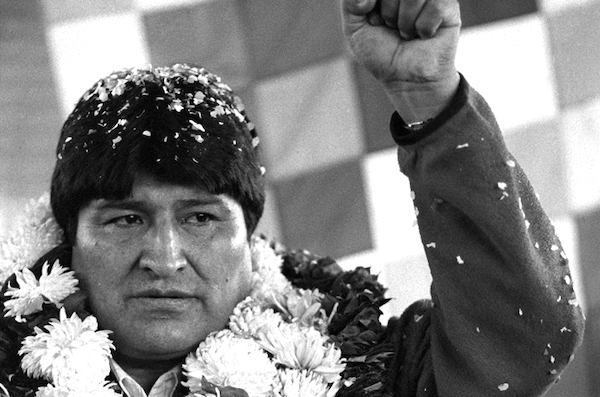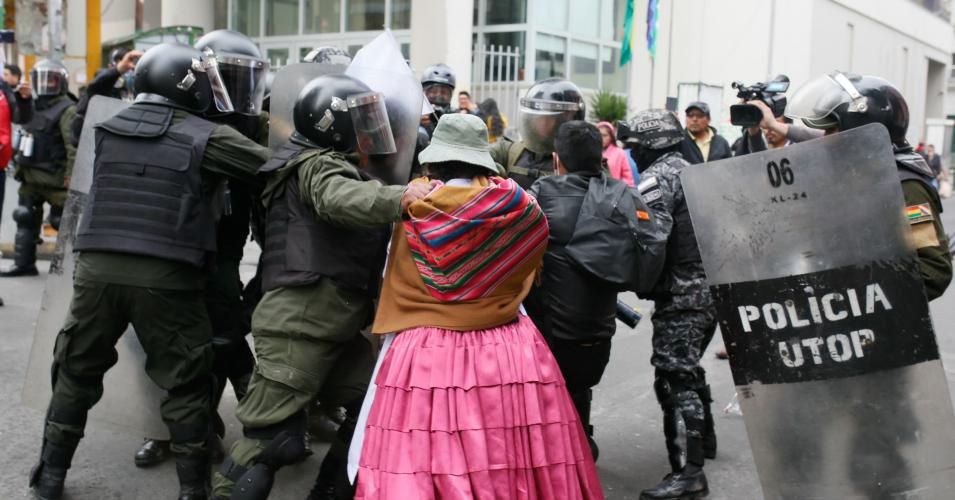
Historians for Peace and Democracy
(November 17, 2019) — The Steering Committee has issued the following statement on Bolivia. Please see also the list of recommended sources included below.
Historians for Peace and Democracy unequivocally condemns the unconstitutional removal of Bolivian President Evo Morales from office on November 10. The coup has directly empowered the Bolivian right, which has a terrifying record of racism, misogyny, and violence. Unsurprisingly, it has received vocal support from the Trump administration.
We recognize that the political situation in Bolivia is very complex and that progressive Bolivians are internally divided, both about the policies of the Morales government and about what should happen next. However, this complexity should not obscure the fact that Morales’s ouster was a coup and that it has greatly strengthened the most reactionary forces in Bolivian society.
We condemn the US support for the coup and call upon all parties to work for a peaceful, just, and constitutional resolution to the crisis.
Here is a brief list of recommended readings on the coup:
Jeffery R. Webber with Forrest Hylton, “The Eighteenth Brumaire of Macho Camacho,” Verso blog, 15 November 2019
- A detailed narrative and analysis of the Bolivia crisis by 2 scholar-activists with decades of experience studying Bolivia. It defies pithy, social-media-friendly summary and should be read in its entirety. But here’s one key passage: “Those parts of the international left based in imperial countries need to insist on the right of Bolivians to self-determination free of outside intervention . . . This does not require that we suspend disbelief, refrain from criticism of Morales, or romanticize his rule.”
Claudia Korol, “Militias in Bolivia Are Burning the Indigenous Flag in Public Plazas,” Truthout, 13 November 2019 (Spanish version here)
- An interview with one of Bolivia’s leading indigenous feminists, Adriana Guzmán, who emphasizes that “this is a coup. We need you to say it. We need you to share in our indignation, our pain, to also share in our fear, in the face of what these armed groups are carrying out.” Guzmán criticizes certain other feminists who fail to appreciate the differences between Evo Morales and the right: “As feminists we have many critiques of Evo Morales, because of his economic framework, because of extractivism. We have questioned his machismo. But we also understand that having a president in whom we can see ourselves, even if he is a machista president, is not the same as having a white, corporate, oligarchic president . . . . We understand the difference.”
María Galindo, “Kristallnacht in Bolivia,” Toward Freedom, 11 November 2019 (Spanish version here)
- Galindo is one of the feminist intellectuals to whom Adriana Guzmán (above) is responding. Galindo argues that the conflict between Evo Morales and right-wing extremist Luis Fernando Camacho is a struggle “between two fascisms” and over “who is the most macho.” Galindo’s perspective has been widely disseminated in progressive outlets and social media.
“A Coup? A Debate on the Political Crisis in Bolivia That Led to Evo Morales’s Resignation,” Democracy Now! 13 November 2019 (Part I and Part II; similar Spanish version here)
- Debate about how to characterize Evo’s removal, its implications, and the role of parts of the left in helping to bring it about. Former Bolivian UN ambassador Pablo Solón versus H-PAD member Kevin Young.
Statement on the Coup in Bolivia: In Solidarity with Bolivians Resisting Military Intervention and Right-Wing Violence

NACLA Editorial Board / North American Congress on Latin America
(November 13, 2019) — On the afternoon of November 10, 2019, Bolivian president Evo Morales announced that he would resign. The resignation came amid ongoing conflict that arose in the wake of the October 20 elections. Evo Morales had declared victory in the first round. The opposition—an amalgam of political forces and positions — argued, albeit with no clear evidence, that the vote was marred by fraud.
Three weeks of intensifying clashes between pro- and anti-Evo groups ensued, with mutual accusations of culpability for the violence. An OAS team completed an audit of the vote and announced on November 10 that there were many irregularities. Nonetheless, no hard evidence has appeared to sustain the allegations of wholesale fraud.
On the morning of November 10, in the wake of the OAS declaration, Morales called for new elections. Later that day, with violence intensifying, the military high command made a statement “suggesting” that Evo should resign.
Some left, Indigenous, and progressive sectors in Bolivia, disillusioned with the slow erosion of progressive aspirations under Evo, also made public statements calling on Evo to resign, or to consider doing so.
On November 12, an opposition Senator was unconstitutionally declared president by a handful of legislators in the absence of a quorum. It is important to recognize the multiplicity of factors that led to the current upheaval, including the MAS’ own role and a history of political miscalculations. However, the unfolding pattern of rightist revanchism, the role of oligarchic forces and external actors, and the final arbitrating role played by the military, suggests that we are witnessing a coup.
As a group of left thinkers, educators, journalists, scholars, and activists we write this letter in solidarity with the Bolivian people. We call for continued support of progressive social movements and continued resistance against revanchist violence and state repression.
We stand with the people of Bolivia who remain vigilant against the rise of neo-fascist political forces and the return of the colonialist, dependent, and racist political regimes of the past. We reject efforts by the media and the US government to demonize the MAS. At the same time, we recognize the limitations of the MAS as a political party, and of the patriarchal and prebendal political system that it has been unable, or unwilling, to change.
At present, a particularly troubling development is the threat to the lives of those Bolivians who are resisting the coup. The return of conservative right-wing forces, fused with anti-Indigenous evangelical Christian symbolism, threatens to run roughshod over the legitimate efforts of many Bolivian citizens to pluralize, democratize, and renovate the party system.
The widespread use of arson attacks—mutually attributed to both sides, though of unclear authorship—has created an unprecedented atmosphere of fear, terror, and chaos that clearly plays into the interests of the reactionary elite. The ransacking of Evo Morales’s house, the burning of Indigenous symbols like the wiphala, and the pervasive racist and dehumanizing language on social media all suggest tactics aimed at absolutely destroying Evo and the MAS as a viable political force.
In the face of these challenges, we stand with those movements in Bolivia that seek to rearticulate a progressive vision of the future. We stand against the restoration of neoliberalism and the hegemony of the IMF and the World Bank, especially as the struggle over Bolivia’s gas resources give way to a new struggle over the future of Bolivia’s lithium.
We stand in support of anti-racist movements that are resisting the racism and fascism of the Right. We stand with women’s and LGBTQIA+ movements who have been fighting for sexual liberation, for a woman’s right to choose, against patriarchal forms of political rule, and for an end to impunity in the face of rising levels of gender and sexual violence.
We stand with Indigenous movements that seek to restore a vision of true plurinationalism, self-determination, and territorial autonomy against the unfettered violence of extractive capital. We stand with workers who seek dignified employment and state support in the face of precarious labor conditions. We stand with farmers who are working toward a future not dominated by agroindustrial capital. We stand with those who are working for a more egalitarian and ecologically sustainable future.
We write this letter on behalf of NACLA (North American Congress on Latin America) and are calling on the international community to provide solidarity and support to the diversity of social movements that exist in Bolivia in this historic moment. We call upon the international community to respect the sovereignty of Bolivian social movements.
NACLA was founded in the wake of the 1966 United States invasion of the Dominican Republic. NACLA offers progressive reporting on Latin America to US-based audiences and has a long history of resisting US imperialism in Latin America.
Posted in accordance with Title 17, Section 107, US Code, for noncommercial, educational purposes.